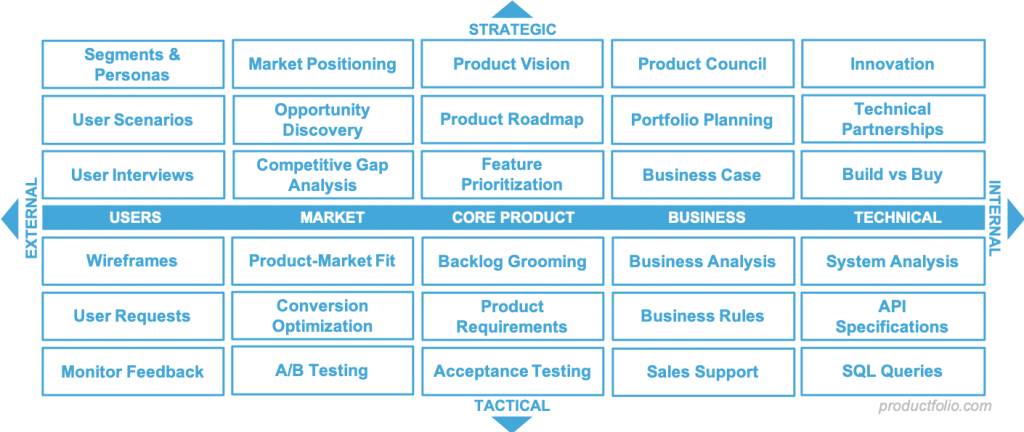
What product management entails, depends on who you are asking. People have different ideas about what it is about due to the seeming lack of a formal definition. This is problematic because it imbues confusion and a lack of confidence about how a PM should spend their time and expectations among managers and stakeholders is often skewed. Consequently, it becomes to easy for Product Managers to slip down the path of focusing on urgent internal and tactical work that is actually more aligned with Project Management than the core strategic responsibilities such as understanding market and customer response to a product.
Why the Need for a Framework?
Evidence suggests that most product managers lack sufficient knowledge about what their roles entail. For instance, 280 Group observed a significant variance in skills in its 2015 survey of product managers and leaders numbering 900. Responses suggested that the skill levels of the higher number of the affected PMs were average at best.
Product Management, as a discipline, is relatively new, particularly in the software/digital domains. People who come into product management are of diverse backgrounds and often lack formal training. This leaves room for different interpretations of what the role is all about.
But how does a product team become successful without really knowing what it takes? This is where having a framework as a guide can help. Such will make it clear what skills are crucial for a PM or product team to succeed. Experienced product managers can also use it to guide the growth of upcoming ones.
Product Team Competencies Framework
You can find a handful of frameworks online that seek to help aspiring PMs and product teams. However, these often don’t cover all the important skills and competencies that are required for working in this field. This is especially true when it comes to digital companies.
The Product Team Competencies framework, Cabage 2017, gives a great idea of the skills useful for different types of PMs. It compares strategic competencies to tactical and external competencies to internal. The type of product manager that you are will decide where you reside in the system.
The top half contains the competencies that are crucial for senior product managers, who Cabage describes as “heads up.” In the top-left portion, you will get an idea of what skills are useful if you’re a consumer or market-facing product leader. On the other side are the likely competencies for technical senior PMs.
The bottom half of the framework pertains to upcoming product managers, usually the “heads down” Product Owners (Scrum). Those working on consumer products usually want to focus on the bottom-left portion. Junior PMs working on internal tools will lean more toward the bottom-right.
How Can this Framework Help?
The Product Team Competencies framework provides a good basis for assessing how teams are doing, and providing everyone with an aligned sense of what to focus on.
This model may also help to pinpoint what your team isn’t doing so great at to enable you to improve. As Cabage points out as an example, a team that performs poorly in external market strategy might want to pay more attention to the top-left section, re-allocate time and/or hire accordingly to round out the teams’ competencies.
Also, if you are someone guiding younger or aspiring product managers, you can use this framework to determine where they best fit in. It also enables you to advise them on what other skills they should consider acquiring based on what they hope to become.
What Competencies Are Most Important?
Product managers usually wear many caps, so to say. They take on more responsibilities beyond what falls neatly into their domain. They need to do this to ensure things run smoothly.
Product Managers and Product Owners work cross-functionally and are ultimately responsible for a successful product. As such, it is helpful to know a bit about what each function on your team is doing, including development, design, marketing, and project management. But it takes discipline and wisdom to know when to pull back and focus on the core Product Management responsibilities that no one else but the PM is responsible for.
The nature of the product you are working on will also determine what skills are more important. Are you working on a B2B, B2C, or technical product? It is safe to say, for instance, that new startups or companies launching new products or features may prefer someone knowledgeable in user research and product-market fit.